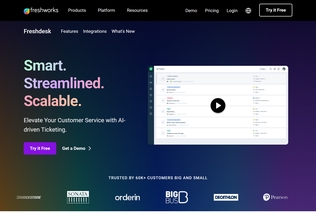Website Speed Test
How Fast Is Your Website?
The success of a website depends on how quickly it loads. Higher SEO results, greater conversion rates, lower bounce, longer visitor dwell time, improved user experience in general, and engagement is all advantages of faster-loading websites. To reach peak performance, make use of the numerous website speed test tools out there.
Your website's speed can define or destroy it. Because of this, website performance testing tools are receiving attention from web designers, marketers, and IT departments. Enhancing the speed at which your page load time can have a significant impact on how well it performs overall. Your performance in almost every area, from customer experience to SEO techniques, is impacted by page speed.
Website speed tests are performed daily and that is one of the ways that website owners are keeping track of their site's speed and performance. It is crucial to know how your site fares on the market and the ways to make it faster. If you wanted to know more about the best website speed test tools, you have come to the right place.
What Are Website Speed Tests?
You can increase the performance of your web pages to benefit both visitors and search engines by using the most popular website speed test tools. The importance of website performance assessments has grown in both marketing and online development. It must always be understood that it is beneficial for users if your website loads quickly.
You don't have to use one tool to test your website. To be comprehensive, you can utilize a variety of tools and conduct numerous tests. Your objective should be to increase page load speed so that users may experience your website more quickly and consistently. A flawless score on a speed test shouldn't be your only goal.
Optimizing your website's load time is now a necessity if you want to turn website visitors into customers. With an optimized website, you may improve user experience and increase conversion rates by encouraging consumers to remain on your web pages longer. Using a tool that enables the identification and correction of web issues will improve performance and is the greatest technique to increase website performance.
How to Perform a Successful Page Speed Test?
You cannot always determine your website's performance by running website speed tests. You can be forced to go more slowly when there is heavier traffic or congestion. Sometimes you can move through it much more quickly since everything is very obvious. The quality and reliability of your results will also be impacted by a number of other factors.
Use Multiple Speed Test Tools
It is advised to use several testing tools and to run several speed tests. Using several tools will give you a range of load times because test results from different tools may vary. In order to determine the average, compare the test results. The time it takes to download the entire homepage is the most significant change that you will see. It's ideal to run three tests minimum to obtain a more precise image.
Test Speed From Multiple Servers
Most solutions for measuring website speed allow testing from many places across the globe. This enables you to learn how various geographic areas could encounter varying website speeds. Consequently, it becomes slower the further you are from the data center. If you have global website users, you can conduct numerous tests to determine how the performance of your website varies by region.
Turn Caching On
On the server and client sides of a cache, copies of HTML files are kept. Utilizing the copied files, rather than requesting them from the web host server again, reduces the time it takes for the next website to load. Before doing the tests, make sure that webpage caching is enabled. You may use this to measure the effectiveness of website caching in terms of performance enhancement.
Check Your Firewall
WordPress caching plugins offer a lot of potential, but they also undoubtedly have some restrictions. For instance, it is unable to stop DDOS assaults and brute force tries. Moreover, it does nothing to combat spambots, wasting a lot of server resources. This is why it is important to test your website's firewall or CDN services.
Why Is Website Speed Testing Important?
Any speed test tool can be utilized for your website's benefit. Web developers use them all the time to try to understand the points that need to be improved. This will improve conversion rates on your website and increase your site performance. Performance monitoring is the biggest benefit you can have from using a speed testing tool at your disposal.
These tools can pinpoint which assets of your website are causing the speed to drop. No one wants a slow website so this is very important. You can increase your page performance if you focus on the things that need to be changed or upgraded. These tools will even go as far as to tell you that some images need to be compressed for a better site's performance.
They analyze load speed, core web vitals, page size, and all other instances of monitoring services. Finally, these tools and websites will give you a clear summary of the results. Therefore, across different devices, you can read the performance summary and see how to make your site faster. It can even be done on mobile devices so you can test your mobile website speed.
What Are the Best Website Speed Test Tools?
The performance monitoring of anyone's website is the number one thing everyone should be doing. It is a clear shortcut from where you are now to the best version of your website. Therefore, many people and companies are using the best website speed test tools at their disposal and many are using more than one.
For that reason, you will find the best tools on our list of 12+ speed testing tools. They come in all shapes and sizes and we have prepared the best ones just for you. So, you can find some amazing tools such as GTMetrics, Web Page Test, and Google PageSpeed Insights at the top of our list. They are being used by most people and their reviews are always positive.
Of course, our list doesn't stop there. We introduce some other tools such as Pingdom, DareBoost, Dotcom Speed Test, Loader, and many others. These tools come for a fair price and you will get all of their special features that will show you the best and worst parts of your website. Therefore, start using them right now.
Are There Speed Test Tools With a Free Plan?
If you take a look at our list, you will find only one tool that doesn't offer free services. It is Pingdom and you have to pay $10.00 a month to use it. Still, the rest of the tools on it come with a free plan that you can use. You can speed-test your websites all you like and you will get the basic results.
Still, it is always better to do the perfect performance monitoring with any of these tools and that can be done if you become a premium member of them. The prices go from $0.04 to $99.95 a month. It depends on what your needs are. If you want the best monitoring and speed testing tool, you will need to share some money with them.
Most of the time, people don't like paying for tools but these are the ones that actually make a difference. They can work with the latest browser versions, include all page elements, and show you how your site performs. They will help you improve your user's experience and vouch for fast loading speeds all around the world.
How to Understand Your Website's Speed Results?
The length of time it takes for your page to load is the most crucial factor that you should consider. Your users are most impacted by this parameter. Users may choose to click the back button, form a negative opinion of your business, and think less highly of your website if it takes longer to load. Therefore, that is the #1 data you need to understand.
You should also keep track of how long it takes your server to send the first byte and how long it takes to react to each request. Also, confirm that browser compression, often known as gzip compression, is operational. Compressing them lowers the difference in file sizes across your server and the user's browser.
The TTFB is the crucial parameter that you should test (time to first byte). You may need to contact your web hosting business if your web server consistently displays a slower time to the first byte. All reputable WordPress hosting providers have in-house caching systems. Results from TTFB could be greatly enhanced by turning on your host's caching solution.
Final Thoughts?
As you can see, there are several website performance testing tools available. As mentioned above, each of them has distinctive qualities of its own. Establishing a baseline for your website and testing it frequently will help you make improvements over time. It doesn't matter if you are using it for free or with a premium pass, the results will be there.
You can find your bearings, monitor your progress, and establish your value with the aid of the tools on this list. And they are free to do all of that. Begin testing your website right now if you want to fulfill that kind of agreement.
#Name | Popularity | Features | Free | Price | Platform |
|---|---|---|---|---|---|
1.Gtmetrix | 100% people use it |  Alerts Set alerts with numerous conditions based on Web Vitals, Page Timings, Total Page size, etc  API Functionality Integrate performance testing into your development environment or application. Get more API credits  Areas of interest Annotate areas of interest on your graph and give your data context  Mobile Analysis Test your page on a real Android device or Simulated Device options  Alerts Set alerts with numerous conditions based on Web Vitals, Page Timings, Total Page size, etc  API Functionality Integrate performance testing into your development environment or application. Get more API credits  Areas of interest Annotate areas of interest on your graph and give your data context  Mobile Analysis Test your page on a real Android device or Simulated Device options  Monitor pages Run a test daily, weekly or monthly to ensure optimal performance  Visualize performance Web Vitals, Page Timings, Page Size & Request Counts, and Performance/Structure scores | $5 | Web | |
2.WebPageTest | 79% people use it |  API Functionality Integrate performance testing into your development environment or application. Get more API credits  Mobile Analysis Test your page on a real Android device or Simulated Device options  Monitor pages Run a test daily, weekly or monthly to ensure optimal performance  API Functionality Integrate performance testing into your development environment or application. Get more API credits  Mobile Analysis Test your page on a real Android device or Simulated Device options  Monitor pages Run a test daily, weekly or monthly to ensure optimal performance | $15 | Web | |
3.Google PageSpeed Insights | 60% people use it |  Alerts Set alerts with numerous conditions based on Web Vitals, Page Timings, Total Page size, etc  API Functionality Integrate performance testing into your development environment or application. Get more API credits  Mobile Analysis Test your page on a real Android device or Simulated Device options  Monitor pages Run a test daily, weekly or monthly to ensure optimal performance  Alerts Set alerts with numerous conditions based on Web Vitals, Page Timings, Total Page size, etc  API Functionality Integrate performance testing into your development environment or application. Get more API credits  Mobile Analysis Test your page on a real Android device or Simulated Device options  Monitor pages Run a test daily, weekly or monthly to ensure optimal performance | Web | ||
4.Pingdom | 44% people use it |  Alerts Set alerts with numerous conditions based on Web Vitals, Page Timings, Total Page size, etc  API Functionality Integrate performance testing into your development environment or application. Get more API credits  Monitor pages Run a test daily, weekly or monthly to ensure optimal performance  Visualize performance Web Vitals, Page Timings, Page Size & Request Counts, and Performance/Structure scores  Alerts Set alerts with numerous conditions based on Web Vitals, Page Timings, Total Page size, etc  API Functionality Integrate performance testing into your development environment or application. Get more API credits  Monitor pages Run a test daily, weekly or monthly to ensure optimal performance  Visualize performance Web Vitals, Page Timings, Page Size & Request Counts, and Performance/Structure scores | $10 | AndroidWebiOS | |
5.Speed Analysis | 32% people use it |  Alerts Set alerts with numerous conditions based on Web Vitals, Page Timings, Total Page size, etc  API Functionality Integrate performance testing into your development environment or application. Get more API credits  Mobile Analysis Test your page on a real Android device or Simulated Device options  Monitor pages Run a test daily, weekly or monthly to ensure optimal performance  Alerts Set alerts with numerous conditions based on Web Vitals, Page Timings, Total Page size, etc  API Functionality Integrate performance testing into your development environment or application. Get more API credits  Mobile Analysis Test your page on a real Android device or Simulated Device options  Monitor pages Run a test daily, weekly or monthly to ensure optimal performance  Visualize performance Web Vitals, Page Timings, Page Size & Request Counts, and Performance/Structure scores | $ | Web | |
6.Dotcom Speed Test | 23% people use it |  Alerts Set alerts with numerous conditions based on Web Vitals, Page Timings, Total Page size, etc  API Functionality Integrate performance testing into your development environment or application. Get more API credits  Areas of interest Annotate areas of interest on your graph and give your data context  Mobile Analysis Test your page on a real Android device or Simulated Device options  Alerts Set alerts with numerous conditions based on Web Vitals, Page Timings, Total Page size, etc  API Functionality Integrate performance testing into your development environment or application. Get more API credits  Areas of interest Annotate areas of interest on your graph and give your data context  Mobile Analysis Test your page on a real Android device or Simulated Device options  Monitor pages Run a test daily, weekly or monthly to ensure optimal performance  Visualize performance Web Vitals, Page Timings, Page Size & Request Counts, and Performance/Structure scores | $9.99 | Web | |
7.Lighthouse Metrics | 21% people use it |  Alerts Set alerts with numerous conditions based on Web Vitals, Page Timings, Total Page size, etc  API Functionality Integrate performance testing into your development environment or application. Get more API credits  Areas of interest Annotate areas of interest on your graph and give your data context  Monitor pages Run a test daily, weekly or monthly to ensure optimal performance  Alerts Set alerts with numerous conditions based on Web Vitals, Page Timings, Total Page size, etc  API Functionality Integrate performance testing into your development environment or application. Get more API credits  Areas of interest Annotate areas of interest on your graph and give your data context  Monitor pages Run a test daily, weekly or monthly to ensure optimal performance | $25 | ||
8.PagerDuty | 18% people use it |  Alerts Set alerts with numerous conditions based on Web Vitals, Page Timings, Total Page size, etc  API Functionality Integrate performance testing into your development environment or application. Get more API credits  Mobile Analysis Test your page on a real Android device or Simulated Device options  Monitor pages Run a test daily, weekly or monthly to ensure optimal performance  Alerts Set alerts with numerous conditions based on Web Vitals, Page Timings, Total Page size, etc  API Functionality Integrate performance testing into your development environment or application. Get more API credits  Mobile Analysis Test your page on a real Android device or Simulated Device options  Monitor pages Run a test daily, weekly or monthly to ensure optimal performance | $21 | ||
9.KeyCDN Speed Test | 17% people use it |  Alerts Set alerts with numerous conditions based on Web Vitals, Page Timings, Total Page size, etc  API Functionality Integrate performance testing into your development environment or application. Get more API credits  Mobile Analysis Test your page on a real Android device or Simulated Device options  Monitor pages Run a test daily, weekly or monthly to ensure optimal performance  Alerts Set alerts with numerous conditions based on Web Vitals, Page Timings, Total Page size, etc  API Functionality Integrate performance testing into your development environment or application. Get more API credits  Mobile Analysis Test your page on a real Android device or Simulated Device options  Monitor pages Run a test daily, weekly or monthly to ensure optimal performance | $0.04 | Web | |
10.Uptrends Speed Test | 14% people use it |  Alerts Set alerts with numerous conditions based on Web Vitals, Page Timings, Total Page size, etc  Mobile Analysis Test your page on a real Android device or Simulated Device options  Monitor pages Run a test daily, weekly or monthly to ensure optimal performance  Visualize performance Web Vitals, Page Timings, Page Size & Request Counts, and Performance/Structure scores  Alerts Set alerts with numerous conditions based on Web Vitals, Page Timings, Total Page size, etc  Mobile Analysis Test your page on a real Android device or Simulated Device options  Monitor pages Run a test daily, weekly or monthly to ensure optimal performance  Visualize performance Web Vitals, Page Timings, Page Size & Request Counts, and Performance/Structure scores | $8.20 | WindowsWebiOS | |
11.k6 | 12% people use it |  Alerts Set alerts with numerous conditions based on Web Vitals, Page Timings, Total Page size, etc  API Functionality Integrate performance testing into your development environment or application. Get more API credits  Monitor pages Run a test daily, weekly or monthly to ensure optimal performance  Visualize performance Web Vitals, Page Timings, Page Size & Request Counts, and Performance/Structure scores  Alerts Set alerts with numerous conditions based on Web Vitals, Page Timings, Total Page size, etc  API Functionality Integrate performance testing into your development environment or application. Get more API credits  Monitor pages Run a test daily, weekly or monthly to ensure optimal performance  Visualize performance Web Vitals, Page Timings, Page Size & Request Counts, and Performance/Structure scores | $299 | WindowsWebMacOS | |
12.Loader | 11% people use it |  Alerts Set alerts with numerous conditions based on Web Vitals, Page Timings, Total Page size, etc  API Functionality Integrate performance testing into your development environment or application. Get more API credits  Monitor pages Run a test daily, weekly or monthly to ensure optimal performance  Visualize performance Web Vitals, Page Timings, Page Size & Request Counts, and Performance/Structure scores  Alerts Set alerts with numerous conditions based on Web Vitals, Page Timings, Total Page size, etc  API Functionality Integrate performance testing into your development environment or application. Get more API credits  Monitor pages Run a test daily, weekly or monthly to ensure optimal performance  Visualize performance Web Vitals, Page Timings, Page Size & Request Counts, and Performance/Structure scores | $99.95 | Web | |
13.GiftofSpeed | 11% people use it |  Alerts Set alerts with numerous conditions based on Web Vitals, Page Timings, Total Page size, etc  Mobile Analysis Test your page on a real Android device or Simulated Device options  Visualize performance Web Vitals, Page Timings, Page Size & Request Counts, and Performance/Structure scores  Alerts Set alerts with numerous conditions based on Web Vitals, Page Timings, Total Page size, etc  Mobile Analysis Test your page on a real Android device or Simulated Device options  Visualize performance Web Vitals, Page Timings, Page Size & Request Counts, and Performance/Structure scores | Web | ||
14.BitCatcha | 10% people use it |  Alerts Set alerts with numerous conditions based on Web Vitals, Page Timings, Total Page size, etc  Alerts Set alerts with numerous conditions based on Web Vitals, Page Timings, Total Page size, etc | Web |
Frequently Asked Questions
Find answers to the most asked questions below.
What is the best way to test website speed?
The best way to test website speed is to use a website speed testing tool, such as Google PageSpeed Insights or WebPageTest.org. These tools provide detailed reports on page loading times, as well as recommendations for improving website performance.
What is a website speed test?
A website speed test is a tool that measures the loading time of webpages and provides insights into how to improve website performance.
What factors can affect website speed?
Factors that can affect website speed include the size of the website, the number of requests the website makes, the quality of hosting, the type of content being served, and the type of web browser.
What should I look for when testing website speed?
When testing website speed, you should look for areas of improvement, such as reducing the size of images, minifying code, reducing HTTP requests, and enabling browser caching.
What is the difference between page speed and website speed?
The main difference between page speed and website speed is that page speed is a measure of the time it takes for a single page to load, while website speed is a measure of the overall performance of a website. Page speed is a more granular measure of performance, while website speed takes into account the performance of multiple pages.




































.svg)
.svg)








.svg)




























